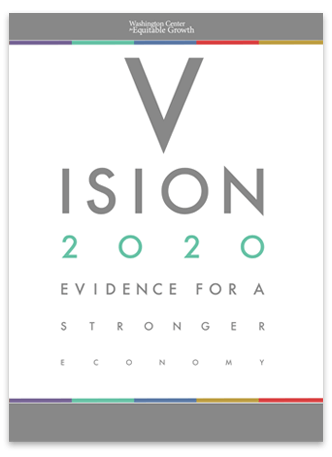Vision 2020: Evidence for a stronger economy

To shape the 2020 policy debate and lead the charge for long-term structural change, the Washington Center for Equitable Growth has released Vision 2020: Evidence for a stronger economy. This book is a compilation of 21 essays by a new generation of scholars who are proposing evidence-backed, concrete, and at-scale policy ideas to reduce economic and racial inequality and boost shared prosperity. Taken together, these ideas form the backbone of an agenda for equitable economic growth in the third decade of the 21st century.
To download the entire book as a pdf, click here.
To read the essays online, click here.
Read the Foreword.
Competition
Fiona Scott Morton, Reforming U.S. antitrust enforcement and competition policy – p. 10
Aaron S. Kesselheim, Improving competition to lower U.S. prescription drug costs – p. 21
Read a summary of each competition essay’s policy recommendations here.
Labor
Sydnee Caldwell and Suresh Naidu, Wage and employment implications of U.S. labor market monopsony and possible policy solutions – p. 33
Alexander Hertel-Fernandez, Aligning U.S. labor law with worker preferences for labor representation – p. 44
Kimberly A. Clausing, International trade policy that works for U.S. workers – p. 54
Arindrajit Dube, Rebuilding U.S. labor market wage standards – p. 63
Read a summary of each labor essay’s policy recommendation here.
Family Economic Security
Maya Rossin-Slater and Jenna Stearns, The economic imperative of enacting paid family leave across the United States – p. 75
Taryn Morrissey, Addressing the need for affordable, high-quality early childhood care and education for all in the United States – p. 86
Susan Lambert, Fair work schedules for the U.S. economy and society: What’s reasonable, feasible, and effective – p. 101
Emily Wiemers and Michael Carr, Earnings instability and mobility over our working lives: Improving short- and long-term economic well-being for U.S. workers – p. 111
Hilary Hoynes and Diane Whitmore Schanzenbach, Policies to strengthen our nation’s Supplemental Nutrition Assistance Program – p. 119
Read a summary of each family and economic security essay’s policy recommendation here.
Tax & Macroeconomics
Owen Zidar and Eric Zwick, A modest tax reform proposal to roll back federal tax policy to 1997 – p. 128
John Sabelhaus, Good U.S monetary policy can’t fix bad U.S. fiscal policy – p. 138
Yair Listokin, Fighting the next recession in the United States with law and regulation, not just fiscal and monetary policies – p. 147
Read a summary of each tax & macroeconomics essay’s policy recommendation here.
Inequality & Mobility
Bradley Hardy and Trevon Logan, Race and the lack of intergenerational economic mobility in the United States – p. 157
Robynn Cox, Overcoming social exclusion: Addressing race and criminal justice policy in the United States – p. 166
Blythe George, Prisoner re-entry in Native American communities offers lessons of resilience and nationwide policy solutions – p. 179
Dania Francis, The logistics of a reparations program in the United States – p. 188
Darrick Hamilton and Naomi Zewde, Promote economic and racial justice: Eliminate student loan debt and establish a right to higher education across the United States – p. 197
Leah Stokes and Matto Mildenberger, A plan for equitable climate policy in the United States – p. 207
Heather Boushey, New measurement for a new economy – p. 219
Read a summary of each inequality & mobility essay’s policy recommendations here.
Events
Event
Vision 2020 Book Release Breakfast, Washington Center for Equitable Growth, February 18, 2020
Event
Vision 2020 Webinar: Focusing on Economic Recovery and Structural Change, Washington Center for Equitable Growth, June 25, 2020

